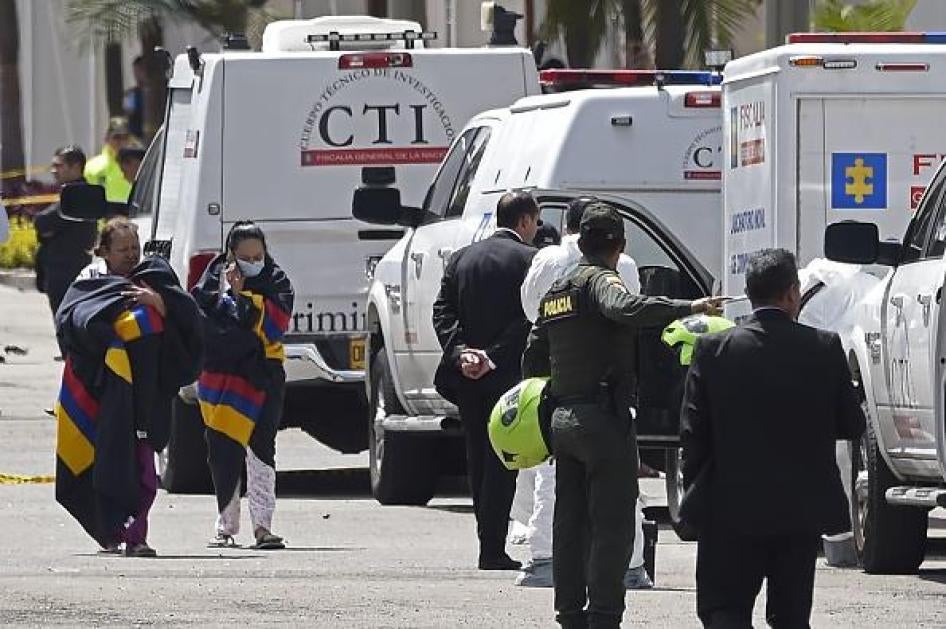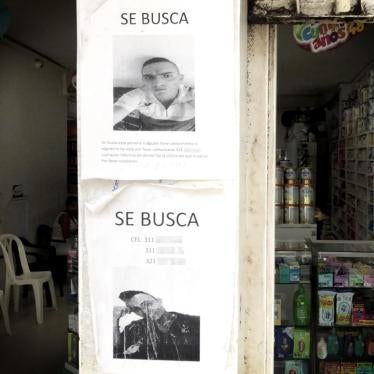The commanders of the National Liberation Army (ELN) like to run off at the mouth about peace, even as their fighters inflict serious suffering.
On January 17, a car bomb exploded at a police academy in Bogota, killing 21 people—many of them young cadets. Days later, the ELN claimed responsibility, saying they had acted in “legitimate defense” and “within the laws of war.” “Peace,” they said, “is the future of Colombia,” as they urged the government to continue the talks despite the attack.
The attack on the police station was brutal— its death toll was among the highest in recent years in Colombia. In its brutality, however, it wasn’t an isolated case.
Even as the ELN conducted peace talks with the Colombian government, our on-the-ground research showed that its fighters were injuring and abusing civilians. In the northeastern province of Chocó, for example, we found that ELN had been recruiting children, murdering civilians, and imposing tight control on many rural communities.
The group has temporarily confined hundreds of people in Afro-Colombian and indigenous neighborhoods to their villages. ELN fighters sometimes forbid civilians from leaving their towns at certain hours or during certain periods. They limit villagers’ ability to work and feed their families. “We couldn’t go down the river, we can’t harvest our crops,” an indigenous teacher who fled her town along the San Juan River told Human Rights Watch. “And if we don’t obey, they’ll hurt us.”
All this coercion is supposed to promote the group’s “revolutionary” cause.
The ELN also continued kidnapping people. In September, for example, ELN fighters kidnapped 15-year-old Mayerli Cortés Rodriguez, accusing her of being a government informant. They released her four days later. Earlier this month, in the northeastern zone of Catatumbo, ELN guerillas shot down a security company’s helicopter, taking the pilot and two guards hostage. The employees have yet to be released.
ELN commanders have held that they have a right to detain civilians. They say that these “retentions,” as they often euphemistically call them, are not prohibited under international humanitarian law and are a legitimate chip to be played during peace talks.
ELN commanders also like to strike a pose against the pervasive killing, in Colombia, of human rights defenders and community leaders. In December, for example, the ELN website ran an article on the “increasing murder of community leaders and human rights defenders,” which it described as a “systematic massacre.”
Murder of community leaders in Colombia is indeed a serious issue—one of the country’s gravest human rights problems. The United Nations Office of the High Commissioner for Human Rights documented 103 cases in Colombia in 2018, up from 84 the previous year. The total may well be higher.
But when the ELN expresses concern, it’s self-serving hypocrisy, because the group itself continues to kill community leaders.
The Office of the High Commissioner for Human Rights has documented the murder of several human rights defenders since 2016 for which evidence points to ELN members. In October 2017, for example, during a ceasefire with the government, the group admitted to killing Aulio Isaramá, an indigenous leader from Chocó. They said it was an accident.
Last Sunday, hundreds of Colombians took the streets to protest the car bomb attack on the police school. The protesters demanded that those responsible be brought to justice. The ELN commanders should understand that Colombians are tired of their hypocrisy. If the guerrillas want to talk peace, they should stop inflicting unnecessary suffering.









